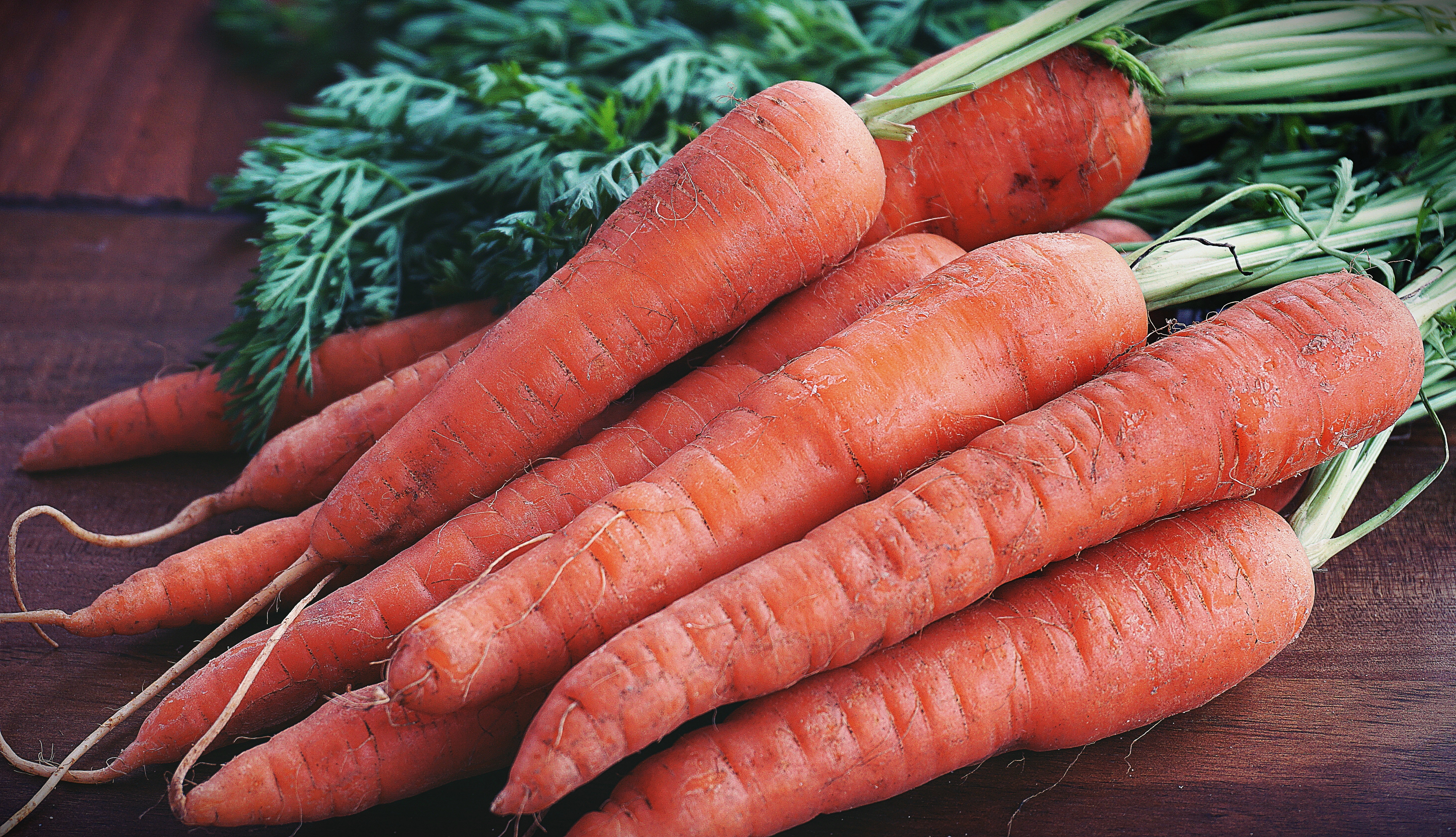A well-liked root vegetable, carrots are renowned for both their health benefits and delicious flavor. They are a staple food in many cultures and are eaten both raw and cooked. Carrots have few calories, a lot of fiber, and lots of vitamins, minerals, and antioxidants like vitamin A, vitamin C, potassium, and antioxidants.
They also include phytochemicals and carotenoids, which have been demonstrated to provide a variety of health benefits, such as increased vision, a lower risk of some malignancies, and better heart health.
Carrots, whether raw or cooked, can be consumed in a variety of ways and are a nutritious and delicious addition to any diet. We’ll look at the health advantages and nutritional content of carrots, as well as how to prepare, store, and incorporate them into your diet, in this post.
What are the Nutrition Facts about Carrot?
Carrots are root vegetable that is high in vitamins and minerals. They are typically consumed raw or cooked and can be added to recipes such as soups, stews, salads, and juices. Carrots are well known for their high vitamin A content, which is essential for healthy vision and skin, among other things. They are also high in fiber, potassium, and antioxidants.
Here’s a table of carrot nutrition facts per 100-gram serving:
| Nutrient | Amount |
| Calories | 41 |
| Carbohydrates | 9.6 g |
| Protein | 0.9 g |
| Fat | 0.2 g |
| Fiber | 2.8 g |
| Vitamin A | 8350 IU |
| Vitamin C | 5.9 mg |
| Vitamin K | 13.2 mcg |
| Potassium | 320 mg |
| Calcium | 33 mg |
| Iron | 0.3 mg |
| Sodium | 69 mg |
| Magnesium | 12 mg |
| Phosphorus | 35 mg |
| Zinc | 0.2 mg |
| Copper | 0.04 mg |
| Manganese | 0.14 mg |
| Selenium | 0.1 mcg |
| Beta-carotene | 8285 mcg |
| Lutein + Zeaxanthin | 256 mcg |
Note: These values are approximate and can vary depending on the specific variety and freshness of carrots.
Reference: Nutritional and health benefits of carrots and their seed extracts
What are the Advantages of Eating Carrots?
It is delicious, crispy, and incredibly nourishing. For instance, carrots are a good source of beta-carotene, fiber, potassium, vitamin K1, and antioxidants ( 1 ). They offer some health advantages as well. They are a food that supports weight loss and has been connected to better eye health and decreased cholesterol levels. Carrots provide the following health benefits:
- Vision health: High in Vitamin A, which aids in the maintenance of good vision.
- Antioxidants: these include antioxidants such as beta-carotene, which aid in cell protection.
- Digestive health: a high fiber content promotes digestive health and helps to prevent constipation.
- Heart health: potassium aids in the regulation of blood pressure and the prevention of heart disease.
- Skin health: Vitamin A and antioxidants aid in the maintenance of healthy skin and the prevention of aging indications.
- Immunity booster: Vitamin C helps to boost the immune system and fight illnesses.
- Low calorie: Carrots have a low-calorie count and can aid with weight management.
- Good for oral health: Chewing carrots can help boost saliva production, clean teeth, and gums, and lower the risk of cavities.
What are the Negative Health Consequences of Eating Too Many Carrots?
Eating too many carrots can have the following negative health effects:
- Overdoes of beta-carotene can induce carotenemia, a disorder in which the skin appears yellow-orange due to a buildup of beta-carotene in the body.
- Too much Vitamin A from carotene sources can cause nutrient imbalances and toxicity symptoms such as dry skin, hair loss, joint discomfort, and eyesight problems.
- Interference with other nutrient absorption: High amounts of Vitamin A can interfere with the absorption of other vital nutrients like iron and calcium.
- Eating a lot of carrots might cause bloating, gas, and stomach pain.
- Eating too many carrots can cause blood sugar spikes, especially in diabetics.
It is critical to maintain a balanced diet and avoid overindulging in any one food, especially carrots. They should be consumed as part of a well-balanced diet.
What are the Ways to Prepare a Carrot?
Carrots can be prepared in a variety of ways, including the following:
- Raw: in salads, dips, or snacks, sliced, diced, or grated.
- Boiled: cooked in water for 10-15 minutes, until soft, and eaten as a side dish or in soups and stews.
- Steamed: steam for 5-7 minutes or until soft, then serve as a side dish or in a stir-fry.
- Roasted: chopped and roasted in the oven with oil and seasonings until tender and caramelized; eaten as a side dish or in grain bowls.
- Cooked: eaten as a side dish or added to sandwiches and burgers after being sliced and grilled on a hot skillet or barbeque until soft and charred.
- Juiced: juiced in conjunction with other fruits and vegetables to create fresh juice blends.
Carrots must be washed and peeled before being used in any recipe. Experiment with various cooking methods and ingredients to find your favorite way to eat carrots. Here’s a quick and easy recipe for roasted carrots:
Ingredients:
- 1 pound peeled and sliced carrots
- One tablespoon of extra virgin olive oil
- One teaspoon thyme dried
- Salt and pepper to taste.
Instructions:
- Preheat the oven to 400 degrees Fahrenheit (200 degrees Celsius).
- In a large mixing bowl, combine the carrots, olive oil, thyme, salt, and pepper.
- Place the carrots on a baking sheet that has been lined with parchment paper.
- Roast, flipping once, for 20-25 minutes or until tender and slightly caramelized.
- Serve warm as a side dish or in grain bowls, salads, or sandwiches.
Enjoy your tasty and nutritious roasted carrots!
How do you Store Carrots?
Carrots should be stored correctly to retain quality and improve shelf life. Here’s how to keep carrots fresh:
- Room temperature: If the carrots are not sliced or peeled, they can be stored at room temperature in a cool, dark, and dry place for several days.
- Refrigeration: Whole carrots should be stored in a plastic bag in the refrigerator for several weeks for extended storage.
- Freezer: Carrots, whole or diced, can be stored in the freezer for up to 8 months. To keep their texture and flavor, blanch them for 2-3 minutes before freezing.
- Damp Cloth: Wrap chopped carrots in a moist cloth or paper towel and store them in an airtight container in the refrigerator to keep them fresh for a short time.
To prevent spoiling, remove any damaged or slimy sections before storing carrots. Carrots’ freshness, taste, and nutritional content will be preserved if they are stored properly.
Is it Better to Eat Carrots Raw or Cooked?
Carrots, both fresh and cooked, have advantages and disadvantages.
Raw carrots provide more fiber and vitamin C, which is lost after cooking. They have a crunchy texture as well as a slightly sweet and crisp flavor, making them great for snacking, salads, and dips.
Cooked carrots are simpler to digest and absorb some minerals, such as beta-carotene, which is transformed into Vitamin A. They can be sweeter and tenderer in texture, making them suitable for side dishes, soups, and stews. They provide a variety of flavor and texture possibilities through various cooking methods such as roasting, grilling, or boiling.
Both fresh and cooked carrots have varied nutritional benefits, so include both in your diet. To guarantee optimal nutritional intake and to appreciate the various textures and aromas that carrots offer, use a range of preparation methods.
When should Carrots be Avoided?
There is no precise time when carrots should not be consumed, although there are various circumstances in which you should limit your intake of carrots:
- Overconsumption: Eating a lot of carrots can cause an excess of Vitamin A, which can induce nausea, dizziness, and skin discoloration.
- Digestive issues: Consuming raw carrots can cause digestive issues such as bloating, gas, and stomach pain in some people. Carrots can be cooked to help alleviate these symptoms.
- Allergic reactions: On rare occasions, some people may be allergic to carrots, resulting in symptoms such as itching, hives, or swelling. If you have any negative reactions to carrots, seek medical attention right away.
- Medication interactions: Carrots have high levels of Vitamin K, which can conflict with various drugs, such as anticoagulants. Consult your doctor before introducing excessive amounts of carrots into your diet if you are taking any drugs.
Carrots, in general, are a nutritious and healthful item that can be consumed as part of a well-balanced diet. However, you should be aware of the amount you consume as well as any personal health issues or restrictions.
Is Carrot Easy to Digest?
Carrots are easily digestible by most people, whether raw or cooked. Cooking helps soften carrots and make them simpler to digest, which is especially beneficial for people who have digestive disorders or difficulty chewing. Raw carrots can be difficult to digest, especially if ingested in large quantities.
However, some people may develop digestive issues after eating carrots, such as bloating, gas, or abdominal pain, especially if they consume a lot of them. If you have stomach issues, start with tiny amounts of carrots and gradually increase the amount.
It’s also crucial to chew your food thoroughly and to avoid eating too rapidly, which can lead to digestive issues. Furthermore, eating carrots with other foods can assist in lessening digestive issues because the mix of diverse foods can aid in the digestion of each dish.
Carrots are a nutritious and healthy item that may be included in most people’s diets. Consult a healthcare expert if you have any concerns regarding your capacity to digest carrots.
Conclusion
Carrots are a diverse, nutritious, and delicious food with numerous health advantages. They can be served raw or cooked in a variety of ways and are high in fiber, vitamins, and minerals.
However, like with all foods, it’s vital to be cautious of the amount you consume, as excess can lead to health problems. Furthermore, some people may develop stomach issues after eating carrots, so listen to your body and seek medical assistance if you have any concerns.
Overall, carrots are an excellent vegetable to have in your diet as part of a well-balanced and healthy diet. They can be enjoyed in a variety of ways, whether raw or cooked, and provide a multitude of nutrients and health benefits.

